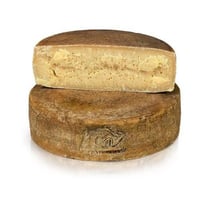Aged cheese: this is a dairy product that undergoes a maturation process that develops over time, which can vary from short to long depending on the type of cheese and the texture desired. The result depends on the skill of the person making it, the processing method, and the quality of the raw materials used. The combination of these elements results in a product with a more or less crumbly core, fragrant and aromatic, which releases its unmistakable flavor upon biting.
Aged cheese: this type of cheese is defined as such because the product undergoes maturation. Therefore, all cheeses that remain still for at least 6 months after their preparation are considered aged. As a result of maturation, all aspects of the cheese undergo variations in terms of substance, consistency, aroma, and flavor.
» TRY OUR SELECTION OF AGED CHEESES «
In fact, the taste becomes more savory due to the salt, the only preservative element added to the product. The percentage of water changes, as it dries out during the maturation period, enhancing the flavor. Externally, the rind thickens, while the interior texture hardens and tends to flake upon cutting. The longer the maturation period, the more these characteristics become evident.
The maturation process involves the degeneration of the proteins and fats in the milk used to produce the cheese. With this process, the cheese becomes more digestible and takes on some pronounced characteristics of flavor and texture depending on the maturation period.
The cheese is left to rest for a period that can vary greatly, from about 6 to 50 months, inside cellars, the most commonly used environments for maturation, where a humidity level of about 90% is maintained.
Some very special cheeses are aged in natural caves or specially built pits. Cheeses aged in these places are known as cave or pit cheeses.
The presence of the product in these environments triggers metabolic processes within the product, thanks to the humidity, temperature, and the large thermoregulated spaces, where conditions are stably controlled and varied to ensure all the organoleptic qualities of the matured product are fully developed.
Aged cheeses are classified based on the duration of the rest or maturation time. Maturation varies from about 6 to 50 months, and the classifications between medium aging, old, or very old depend mainly on the type of cheese.
Generally, cheeses with medium aging are those that rest for more than a month but less than six months, such as Fontina, Asiago, or Gorgonzola. Long aging involves a period exceeding six months and includes cheeses like Parmigiano Reggiano or Grana Padano, among the most famous cheeses in the world.
As maturation progresses, the cheese's texture tends to harden and flake; thus, aged cheeses can also be defined based on the type of texture, semi-hard, hard, or extra-hard. The last category includes cheeses aged over 12 months.
Some aged cheeses are subjected, during the resting period, to specific types of molds that give the rind a soft texture and a whitish color. This is the case with Brie and Gorgonzola, also known as "soft crust cheeses".
Among the long-aged cheeses, there are some particularly prized ones, with an intense flavor that can be enhanced with excellent acacia honey or paired with a full-bodied wine. Among these, the Vezzena stravecchio stands out for its great personality developed over its more than twenty-four months of aging on wooden boards to intensify its flavor. The Asiago DOP Oro del Tempo is also of great value, acquiring a unique, sweet, and creamy flavor due to its aging of over 10 months, thanks to the skill of cheese makers passed down since the distant year 1000 on the Asiago plateau.
» TRY OUR SELECTION OF AGED CHEESES «
One of the reasons why aged cheese is often preferred to fresh cheese is precisely this: it contains no lactose. Additionally, it has less fat and more calcium, truly important properties. The aging of the cheese leads to a certain maturation, allowing it to contain more calcium, as in the Parmigiano Reggiano, which is indeed very suitable for children's diets: 100 grams of this cheese contain the daily calcium requirement for an adult. Thanks to aging, many substances are auto-digested by the cheese itself, making the final product much more digestible.
Finally, here’s the good news for lactose intolerant people: in hard and extra-hard cheeses, with aging exceeding 36 months, the presence of lactose is close to zero as lactose transforms into lactic acid during the resting period. Therefore, aged cheese with these characteristics can be consumed even by those who are lactose intolerant.
Aged cheese, a precious gift of time: perfect for a tasty appetizer in the company of friends and to make any moment of the day unique and flavorful!
Antonella Iannò
 S&M
S&M
We recommend that you enjoy
Di seguito 8 di 851 recensioni di clienti Spaghetti & Mandolino

Negozio fantastico e affidabile con prodotti di qualità. Consegna perfetta della spedizione.
Petr Wolf
Molto contenta e grazie per la disponibilità
Parvati
Ottimi prodotti che uso da molto tempo ed ogni tanto assaggio qualche altro formaggio di capra per variare la mia dieta.
Enzo
Prompt efficient delivery of goods as ordered.
David Mc
Tutto perfetto. Venditore serio, prodotto selezionati e di qualità. Prezzo buono servizio impeccabile. Conpro spesso da loro.
Francesco
Les produits sont de qualité, à un prix raisonnable et surtout très bien emballés; j'aime particulièrement la Sopressa veneta ou le fromage Monte Veronese...
Très bon vendeur
Fair prices, good quality, excellent service. Will return!
Gert L4.9/5
Spaghetti & Mandolino ha ottenuto un punteggio medio di soddisfazione del cliente di 4.9 su 5 nelle ultime 100 recensioni
Scopri di piùServizio in collaborazione con TrustCart che raccoglie e cataloga i feedback di utenti che hanno acquistato su Spaghetti & Mandolino
✔ You have added the product to your cart!
